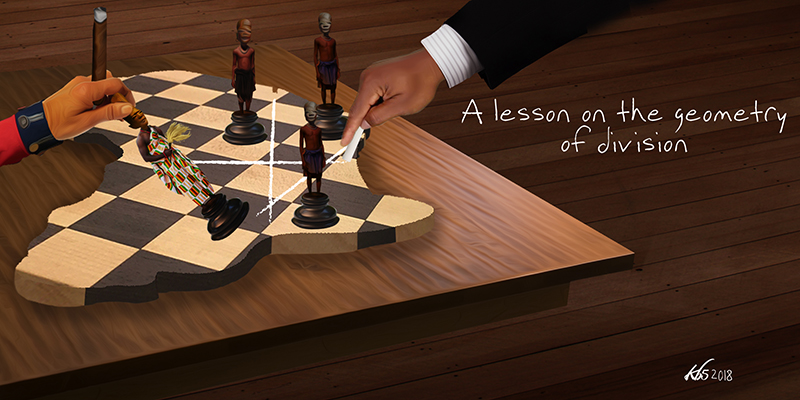As the United Nations Security Council debated Russia’s move to recognise the independence of two breakaway regions in Ukraine and to deploy “peacekeepers” there, a speech by Martin Kimani, Kenya’s UN ambassador, caught the attention of many. It is being described as one of the best speeches delivered at the forum. In it, Kimani eloquently expressed Kenya’s opposition to Russia’s actions and to the idea of using force to change borders left behind by collapsing empires.
In not so many words, the Kenyan envoy asserted that Russian President Vladimir Putin, who in a rambling speech just hours before had bemoaned the dismemberment of the USSR in 1991, could take a lesson from the African experience.
“Kenya and almost every African country was birthed by the ending of empire. Our borders were not of our own drawing,” he said. “Had we chosen to pursue states on the basis of ethnic, racial or religious homogeneity, we would still be waging bloody wars these many decades later. Instead, we agreed that we would settle for the borders that we inherited. But we would still pursue continental political, economic and legal integration. Rather than form nations that looked ever backwards into history with a dangerous nostalgia, we chose to look forward to a greatness none of our many nations and peoples had ever known.”
It was a masterful performance, but one that is quite troubling for its seeming valorisation of the colonial order that continues to this day. Africans, according to Kimani, had not known greatness before the white man arrived and with his departure, had apparently left them with the framework to pursue it.
The Charter of the Organisation of African Unity (OAU) to which he referred established the inviolability of colonial borders, to a large extent putting to bed a debate over how to undo the colonial legacy – the assembly of 32 heads of state and government who signed it in May 1963 in the Ethiopian capital Addis Ababa basically decided not to.
According to Kimani, this was “not because our borders satisfied us, but because we wanted something greater forged in peace”. Renegotiating the boundaries and the colonial systems built on them was seen as not only a recipe for chaos, but also a barrier to “something greater” for the rulers (the preamble to the Charter prophetically begun with the words “We the heads of state” not “We the people”).
As the late Tanzanian leader, Mwalimu Julius Nyerere, would later remark, once “you multiply national anthems, national flags and national passports, seats at the UN, and individuals entitled to 21 guns salute, not to speak of a host of ministers, prime ministers, and envoys, you have a whole army of powerful people with vested interests in keeping Africa balkanised”.
Independence was thus little more than a coat of paint. Like their colonial predecessors, the shiny new states would continue to be built on extraction from the Africans. Independence would mean freedom for the state, not for the people. Along with “respect for the sovereignty and territorial integrity of each state and for its inalienable right to independent existence”, the OAU Charter also enshrined the principle of “non-interference in the internal affairs of States” which meant rulers could do as they wished within the colonial borders.
In 2013, Kimani’s boss, President Uhuru Kenyatta, who, along with Deputy President William Ruto, had taken office while charged with crimes against humanity in relation to the 2007-08 post-election violence, successfully pushed for reassertion of impunity for heads of state at the OAU’s successor, the African Union.
Kimani’s predecessor, Ambassador Macharia Kamau, also presented the argument for impunity to the UN, urging the Security Council to void Kenyatta’s prosecution. At one function, he would even assert that people kicked out of their homes by the election violence had benefitted from their displacement. “They’ve come out way ahead,” he said, arguing that many of those subsequently resettled by the state had been squatters before the violence.
So when Kimani speaks of “complet[ing] our recovery from the embers of dead empires in a way that does not plunge us back into new forms of domination and oppression,” the fact is the opportunity to do so was scuttled long ago by the people he represents at the UN – “we the Heads of State”.
Further, while he is right to condemn Russia for its violations of Ukrainian sovereignty, the stench of hypocrisy permeates his speech. After all, in October 2011, Kenya itself massed troops and equipment on the border with its neighbour, Somalia, and sought a pretext to send them across, despite dire warnings from the West. To date, the country has refused to comply with a ruling from the International Court of Justice on the maritime border with Somalia, preferring instead to withdraw from the court.
That Kimani’s speech has garnered praise from former colonisers who like to pretend they were doing Africans a favour should thus come as o surprise. To be sure, Russia needed to be condemned and the things he said in that regard needed to be said. Only he said much more than he should have and, in any case, Kenya was perhaps not the best nation to make the argument.








